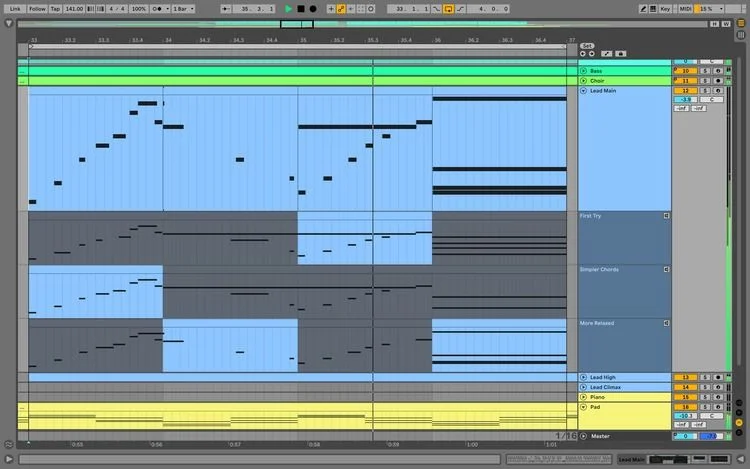Ableton Live allows you to easily create, produce, and perform music in one intuitive interface. Live syncs everything and works in real time, so you can play and change your musical ideas without interrupting the creative process.
But Live also features the revolutionary Session View: a unique notebook for improvising, playing and performing with musical ideas, without time limits. Freely and independently start and stop any number of audio or MIDI loops – everything stays in sync.
Almost everything in Live works in real time—add, reorder, or remove devices, play with Live’s flexible track routing, and more—all without interrupting your creative flow. Create bolder sounds with new Live devices.
Stay in the flow with tons of workflow improvements. Get even further away from your computer with Push. Create your sound with a curated library. And get the unlimited potential of Max for Live, seamlessly built in.
Almost three years after the release of the tenth version of the program, Ableton introduced a major update to Ableton Live 11. The developers added new features and devices to the program, and also improved existing functions. According to the creators, the update focuses on providing new capabilities for “recording, performing and experimentation.”
The first notable innovation was the updated Comping function for combining audio. The DAW now organizes multiple repeats of audio files and MIDI regions into separate takes, and users can mix different parts of different takes together to get the “perfect” part. In addition to this, Ableton Live has learned to link two or more tracks together for simultaneous processing.
Ableton Live 11 has received full support for the MIDI Polyphonic Expression (MPE) standard. The program has a new Expression View workspace, which allows you to work with different envelopes to achieve the desired level of expression. The built-in sampler, arpeggiator and wavetable editor also receive full MPE support.
As for new devices, the program has been replenished with ten new devices. Hybrid Reverb will allow you to create algorithmic and convulsive spatial effects. Spectral Resonator will split the audio into several parts to further change them over time based on the frequency of the sound. In turn, Spectral Time can work with broken parts and create interesting delay effects based on them.
For lovers of creative and experimental processing, the creators of the update have added a collection of tools and effects called Inspired By Nature. The collection’s devices were inspired by various natural and physical sound phenomena. In addition to this, the program received the PitchLoop89 tool, which combines glitches, delay and vibrato.
For stage and concert needs, Ableton Live 11 received the Live Tempo Following function. According to the developers’ description, the program has learned to “listen” to incoming audio from other performers and instruments on stage and automatically adjust the tempo based on the received signal. If someone plays faster or slower, Ableton will automatically adjust the tempo so that the parts sound coherent.
The new Macro Snapshots feature allows you to save copies of macros for later use. Up to 16 macros can be stored within a rack, and their launch and operation can be completely randomized.
The developers expanded the automation system by introducing the Follow Actions tool. With its help, users can specify exactly what actions will be taken after a certain event.
Another innovation is the Note Chance function, aimed at humanizing performance. The function sets the probability of any sound within a project or part being triggered and heard, allowing Ableton Live to generate multiple variations of a single pattern. Moreover, Note Chance can be configured so that the pattern changes over time.
Along with Note Chance, the program introduced the Velocity Chance function, which changes the speed of sound extraction in MIDI regions based on the specified settings. Working simultaneously with Note Chance and Velocity Chance will create unique and non-repetitive patterns, and will also make it easier to animate MIDI parts.
Other updates to Ableton Live 11 include Voice Box tools for creating vocal-based instruments and racks, Mood Reel and Drone Lab for texture generation. The software will also include the Upright Piano virtual piano, as well as the Brass Quartet and String Quartet. The last three instruments were created in collaboration with Spitfire Audio.
The developers note that the new version will bring improved tools and devices from previous versions, as well as an updated and expanded content library. A number of improvements also affected the editing of clips and the system for measuring the load on the computer processor. In the MIDI editor, hints with scales, modes and scales have appeared, indicating which notes will “suit” the current key of the project.
Live 11 Release Notes History
- Install Ableton Live 11 Suite Installer.exe
- Place and replace the file Ableton Live 11 Suite.exe_in the folder with the installed program. By default
C:\ProgramData\Ableton\Live 11 Suite\Program
Note:_If you changed the installation folder, then the file must be placed in it. (*\Ableton\Live 11 Suite\Program)
- Launch Ableton Live Suite and in the window that appears, click “No internet on this computer”. From the window that appears, copy “Your hardware code”.
Note:_When you click on “Save”, you can get a text file with the code.
- Run ABLETON KEYGEN.exe, write version “11” > Enter > enter hardware code/ID from the registration window Live 11 > Enter (generated by Authorize.auz)
- Drag the Authorize.auz file to the registration window “Authorizing your software offline”
- Disable updating: Options > Preferences > Licenses Maintenance > Get Automatic Updates > Never


keygen not in the downloaded file, the authorized license file is not valid
If you see those blue buttons do not press it! these are coinminers, never run anything with something like “vcrunner” or anything like that.